
eXtensions - Friday 9 August 2024
By Graham K. Rogers

Among M4 Mac rumors is a new and smaller Mac mini. Some critics claimed Apple was slow on AI while it was under development for years. Now that a first beta has been released, it is not working how pundits think it should. I had much enjoyment this week from the Director's Cut of Rebel Moon: both parts are much extended. Criticism here of an Apple advertisement led to its worldwide withdrawal, now some local users are upset about the withdrawal. It was not "the entire nation" who saw the video as negative.
On Thursday morning here, there were updates available for Apple operating systems: iPhone (iOS 17.6.1, iPadOS 17.6.1, macOS 14.6.1). I checked but the Watch was up to date with version 10.6. The iPhone and iPad mini were first while I backed up the Mac, then downloaded macOS. I updated the iPadPro a while later as I use that first to check news after breakfast. All the updates, which we were told had bug fixes, installed smoothly. In his notes, Howard Oakley (Eclectic Light Company) reported "small build increments in the Security framework [of macOS] and some keychain-related files such as Keychain Circle Notification app"
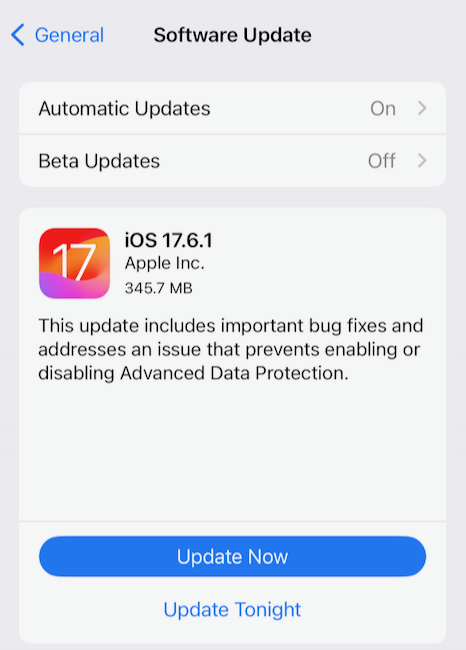
|
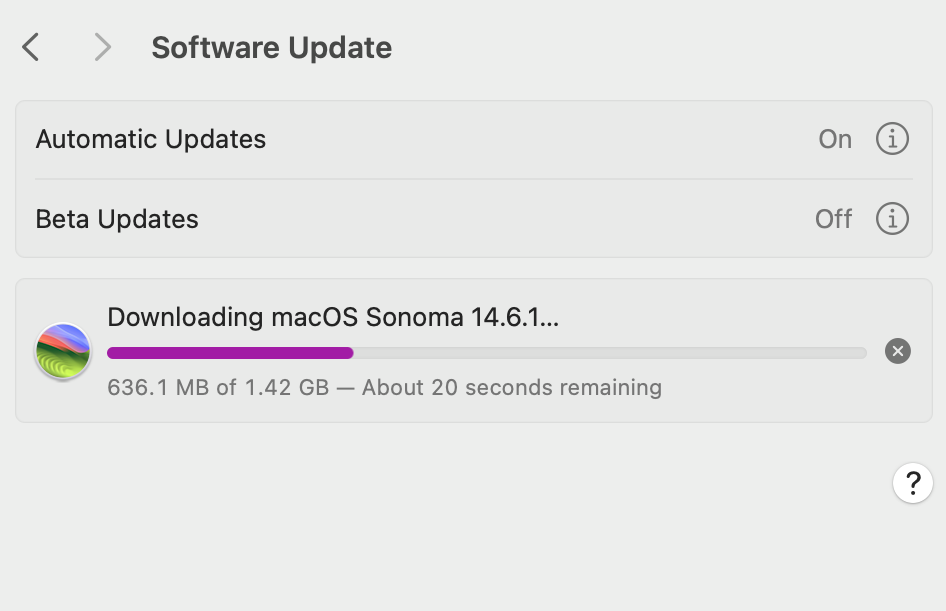
|
I have been a fan of the Mac mini since it first arrived (January 2005, 1.25 or 1.42GHz). I currently have the M1 version and that works well as an office backup device. With rumors this week that M4 Macs will be appearing soon, it is not a surprise that this would include the Mac mini, but a number of sources, including Hartley Charlton (MacRumors), suggest that not only will the next version have the M4 or M4 Pro chips, depending on specifications, but it will be redesigned. It is said to "approach the size of an Apple TV, but it may be slightly taller than the current model". It will still be aluminum (or aluminum if you prefer). It is described as "essentially an iPad Pro in a small box" which will please some commentators who, despite the popularity of the iPad Pro with iPadOS, seem to think that we should be using macOS on the thing. Thank goodness tech pundits do not control policy at Apple.
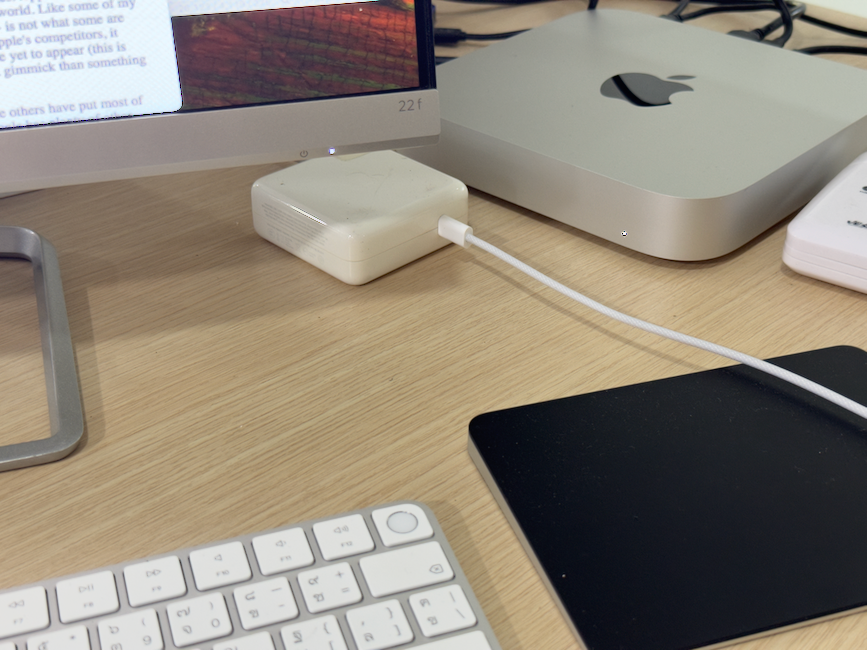
A rumor this week concerning Apple's introduction of AI caused some concern. When Apple Intelligence was announced at WWDC in June, it was as part of of the soon to arrive iOS 18 (and other operating systems) with a gradual roll out over the next few months. With the expected announcement of the iPhone next month, Apple took the unusual step of splitting the beta releases with 18.0 and 18.1. The latter was however restricted to some developers, and only in the USA, although there were some ways to circumvent that.
Several sites picked up on a comment from analyst Neil Shah at Counterpoint Research that Patently Apple described as "wild", although most other sources since have taken the rumor at face value. The idea posited was that services make a lot of money for Apple so they will want to monetize this, although the relationship with ChatGTP was announced as not involving money as both parties will receive benefits.
While online comments seemed as if this move was to be expected, there was nothing on this at WWDC, but since this rumor from Shah began to circulate this week, there has been nothing to deny or confirm from Apple. Later in the week, Connor Jewiss (iMore) expanded on the idea of subscription or paywalled AI features, mentioning a comment by Mark Gurman a month ago concerning the evolution of AI into Apple Intelligence+ - basic AI services for most users with advanced features for subscribers.
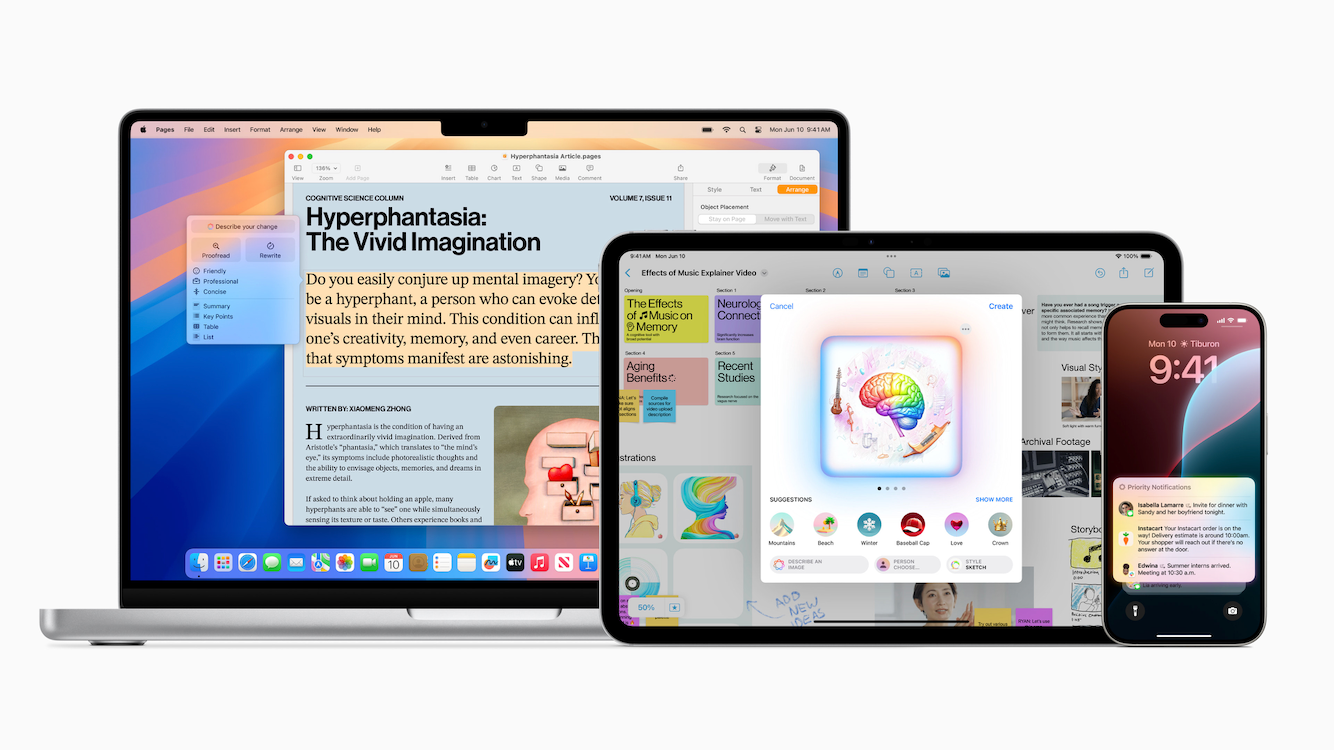
Before Apple announced its AI approach at WWDC, several commentators were wringing their hands expressing concern that the company was behind on this technological aspect. WWDC suggested that not only had Apple been chipping away at this for several years, but the overall strategy was well-formed. The Machine Learning Division headed by John Giannandrea was set up around 2018: 6 years ago. In the few days last week and this following the release of the first beta (iOS 18.1) with AI features, there was more hand-wringing with several pronouncements made based on what was said at WWDC when the features were outlined and a look (a few days only) at a beta release. Dan Moren (MacWorld) has a calmer examination of what Apple is up to noting that how Apple is implementing this is different from other companies. That is nothing new, and Moren is right to point this out, but much of the hoo-hah directed at Apple often fails to take into consideration the way Apple works, and has always worked.
At present the approach seems "overwhelmingly. . . modest". Why release a feature that does not work? That is the approach of other companies. Apple does mis-step on occasions, but this is thankfully rare. While Moren (like me) is content with the softly-softly approach, others are not. That is the way of the world. Like some of my writing students, they think they can start with the finished product. The low-key approach that Apple is taking here - "they stay out of your way unless you want them" - is not what some are used to. They seem to feel that AI should take over (heaven forfend). Moren adds, "That subtlety might seem obvious, but looking at a lot of Apple's competitors, it seems clear that they subscribe to a belief that they need to put these features front and center. . . ." Some of the more "in your face" features are yet to appear (this is beta remember), and generally Moren is well-satisfied with the play so far, with one exception (Image Playground): "it stills seems more like a gimmick than something useful". Duly noted. Apple can fix that.
This is a useful read and Moren's comments are worth taking on board (by Apple as well as commentators), particularly the point that, while others have put most of their eggs in the AI basket, this is "not an existential bet-the-company threat in the way it is with, for example, Google." As noted below, Google has plenty of other problems this week. Moren's closing words are worth carving on the lintel above any tech company's entrance: "[T]here's a strong argument that a modest and cautious approach is the right one."
I use the Newsify news reader for RSS feeds from news services and sites that interest me from around the world, so I have a range of opinions and information to draw on. I spotted a Guardian article this week about the two Netflix movies, Rebel Moon, Parts One and Two. I had watched them when they both came out (Dec 2023 and Aug 2024) and, despite negative reviews from critics, I enjoyed Zack Snyder's production, particularly the performances from Sofia Boutella (Kora) and Edward Skrein as Admiral Atticus Noble. With the latter I found myself making endless comparisons to Cillian Murphy's performance as Tommy Shelby in Peaky Blinders. He strides through scenes killing opponents with no regard for his own safety, but also shows himself to be a character devoid of ethics or any moral compass.
The Guardian had a new review on the Director's Cut versions of the two movies, with Jesse Hassenger commenting on the considerably-extended version - "an absurd 377 minutes" (compared to the original 134 minutes). I sat through the two parts, over 4 evenings, and enjoyed almost every minute, from the explosive beginning that was not in the original, to the (also new) ending of Part Two which added a new slant to the whole movie. On the way, I was served with much blood and gore, along with several new scenes; and with my second watching of the movie noticed countless small details that (for me) made it so enjoyable in the first place.
One of these detail moments comes close to the end as the massive battleship is in its death throes and Kora defeats Admiral Noble, by trapping him between closing steel plates of a door, then slicing his head in two (an effect used in Jonny Mnemonic [1995] several times). Kora's partner looks on and retches as this happens: an unusual detail. Although the retching had been in the original version, the detail of the execution was new. The new treatment gives the new version a significantly different meaning. I wanted a Part 3 before (the original ending teases this), now I want it even more.
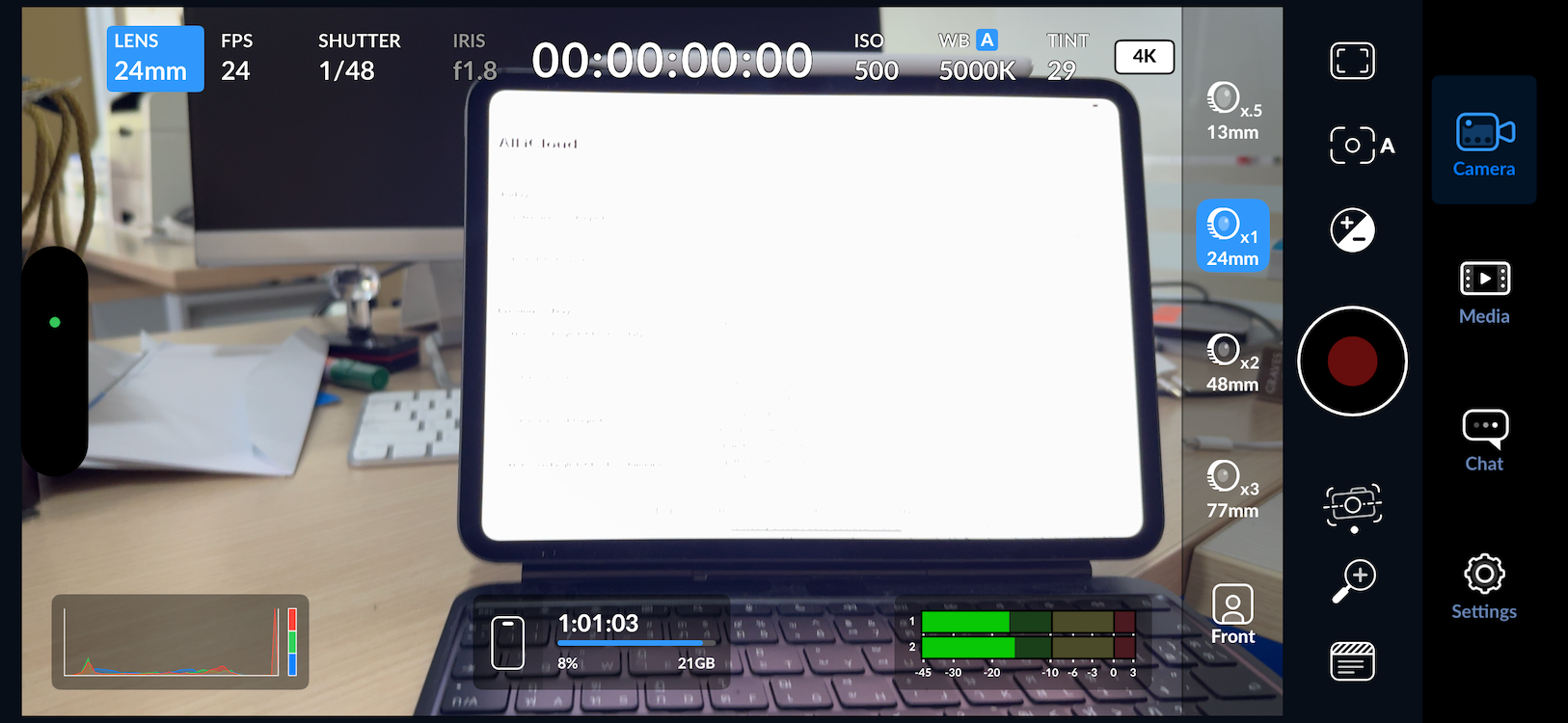
Cast your minds back a year or so to the Scary Fast event at Cupertino when the MacBook Pro and 24" iMac appeared with the M3 chips. Time flies as this week we are told M4 Macs are now on the way. However, a small note in the credits at the end caught the eye (I had to replay this when I watched the next day): the whole event had been filmed using the iPhone 15 Pro Max. There is a good explanation of how this was done on the Apple site. OK they had some other hardware like gimbals and cranes: who wouldn't? But the camera was not a super Red (now owned by Nikon) or Sony, or Canon, but Apple's own iPhone. I have the iPhone 15 Pro and with the super fast Samsung T7 SSD and a CalDigit Thunderbolt 4 cable, I can record video in ProRes HDPro at 60fps.
When it was revealed that the software used to make the video was Blackmagic, I downloaded it right away and tried a few clips. It has a good set of controls for those that need such fine-tuning and, as the Apple output showed, could turn out some first rate video. I also installed the app on my iPads, although it was in the iPhone style (x1, x2) format which I do not enjoy using. Now Blackmagic has been updated to version. As well as new features like multi camera control (similar to Final Cut Pro) this includes a full-screen version for the iPad and it looks quite good. It is not quite as tunable as the iPhone version, for example there is only one lens (plus front), rather than the 3 (+ front) available on the iPhone 15 Pro; and I have not yet been able to set up the multi-camera inputs, but this adds to the better input that the app and the iPad Pro allow.
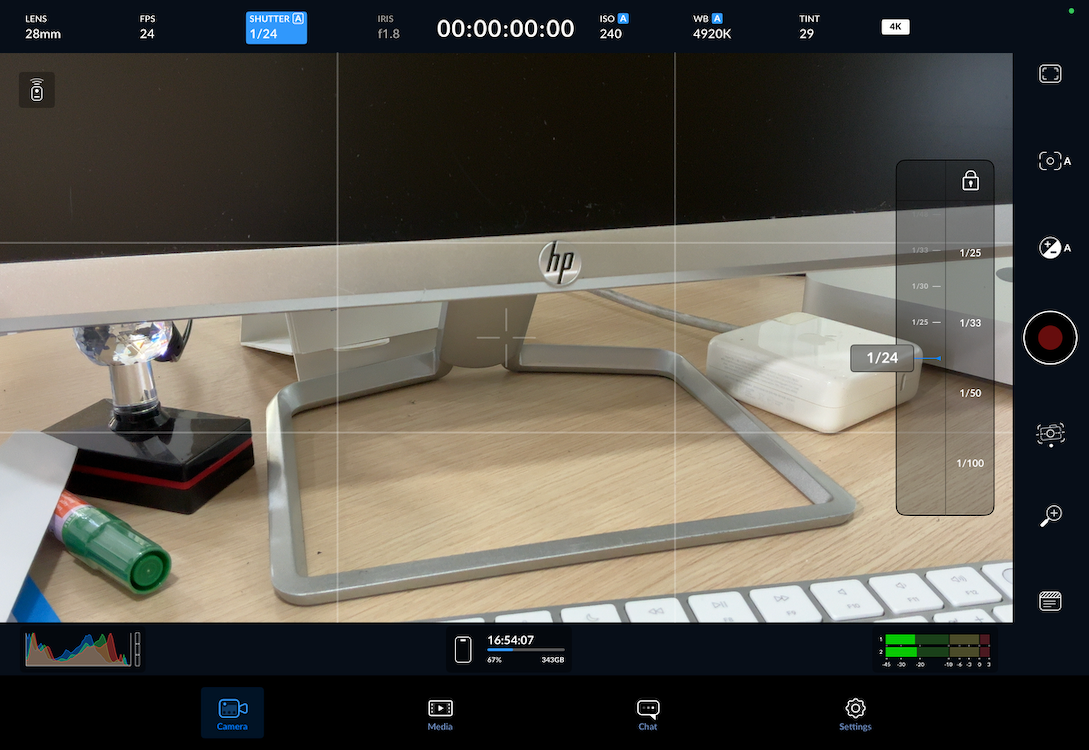
This week, a court case decided that Google was an illegal monopoly. The case centers round the way searches are conducted with Google as the default on Android phones and the iPhone. Judge Amit Mehta ruled that "the contracts Google uses to secure that position violate fair competition laws." Apple is involved to the tune of $20 billion a year. As Paresh Dave (Wired) writes, now the judge has to figure out what to do about it and goes through some options: fines (massive fines); removing the default option (a given really); divestiture (remember AT&T?).
The article also discusses other potential options in some detail. Some of the actions by Google when preparing for the trial would certainly not have impressed the judge and may well have confirmed that the monopoly existed and had to be ended. Cliff Saran (Computer Weekly) writes that Google recognized the risks if Apple Safari users switched to alternative search engines, calculating "that it would cost Apple billions of dollars to develop" their own. The Court did not penalize Google for failing to preserve chat evidence, but noted that Google had "directed its employees to avoid using certain antitrust buzzwords". Also, by including its lawyers in any related communications, it was claimed that their "lawyers withheld tens of thousands of records on the grounds of privilege." It is always the cover up.
Apple users already have the option of changing the default search in Settings > Safari, with the options on my iPad shown as Google (default), Yahoo, Bing, DuckDuckGo, and Ecosia. Google does produce a wide range of links, but it is always worth sifting through the results to weed out some of those that are less relevant. Yahoo has not been a strong choice for years. Bing? Oliver Haslam (iMore) reports that Eddy Cue is of the opinion that "there's nothing that Microsoft could do to make Apple switch to Bing" - including signing the whole company over. I know nothing about Ecosia (my bad - see below).
 So I looked, switching the default to Ecosia, I first tried ego-surfing. When I last tried this with Google it was full of results that were not me and I would have to go through several pages to look at a fair selection. With Ecosia, the first two pages were spot on, with a couple of results showing an American actor with the same name. As I looked through other pages, the results began to thin out (as expected). At work when checking academic writing I often check lists of references for accuracy and veracity (a recent paper had several listed that did not exist - an AI special, perhaps). I started with an Author name plus title and that came up right away. A short title (no authors) was also easily found. Searching for a pair of authors brought up the article I was after in a list of others - a reasonable result in the circumstances. I plan to keep this as default for a few days.
So I looked, switching the default to Ecosia, I first tried ego-surfing. When I last tried this with Google it was full of results that were not me and I would have to go through several pages to look at a fair selection. With Ecosia, the first two pages were spot on, with a couple of results showing an American actor with the same name. As I looked through other pages, the results began to thin out (as expected). At work when checking academic writing I often check lists of references for accuracy and veracity (a recent paper had several listed that did not exist - an AI special, perhaps). I started with an Author name plus title and that came up right away. A short title (no authors) was also easily found. Searching for a pair of authors brought up the article I was after in a list of others - a reasonable result in the circumstances. I plan to keep this as default for a few days.
Last time, I mentioned the apparent backlash that had met an Apple advertisement here. I rolled my eyes when I saw it, but did not think it was worth writing about at that time. That of course changed when the tech press got hold of it. The scenes depicted had been filmed here but did not really represent the modern Thailand that has developed in recent years although the advertisement was made entirely by a Thai team. That may not have been taken into full consideration when later decisions were made. It looked more like an alternative, retro version of how things were, in some ways, in the 1960s and 1970s. You could see this still in some movies and other advertisements produced here as Thais like to laugh at themselves and sometimes look back to earlier times as many societies do. But Apple.
Although I have lost count of the number of advertisements that poke fun of life here, with some award-winning output. There was recently a locally made series on Netflix, called Doctor Climax, which dealt with social-sexual problems in the 1970s. It is in Thai, with subtitles, and was one of the funniest series I have seen this year. There was also the memorable series produced by GTH (and shown on Netflix), Hormones. Scores of movies have been made here, but some that have come up in this context are Lost in Thailand, Hangover, and Bangkok Dangerous, a 2008 movie starring Nicholas cage as an assassin which had several locations here (mainly Bangkok) which was filmed entirely by a Thai crew. If you want movies or series that do not take themselves seriously, try output starring Petthai Vongkhamlao. That said, there are some excellent movies made here, for example, Uncle Boonmee who can Recall his Past Lives, that won the Palme D'Or at Cannes in 2010. Add to that The Legend of Suriyothai, and Tom Yum Goong. There are many more, Thai and Western (Bangkok Production Company).

If Apple had not withdrawn that video the fault-finding would no doubt have increased, despite the support that has now been shown. Before I saw comments in the online tech press, I had seen nothing about this, despite the online reading I do and social media I access, so that comment by one of the chorus about the backlash from the entire nation of Thailand, was overstated, particularly considering the reactions that followed.
At the weekend I began to see some lengthy comments on Facebook. These were marked as Like by friends and students. They were in Thai, but translations are available. I have left these un-edited. The translations are never perfect English, but the mood is clear. Several Thais regret the removal of the advertisement by Apple. The first I saw from someone in the travel industry, included, "Because of crazy movies like this is what they call parody. It has created a tourist trend for Thailand many times."
The second comment I saw, listed the reasons in an easy to read format, including comments from customers in Malaysia and Singapore about the effectiveness of the Thai film industry: "You guys . . . are the GOAT in south east Asia". The final Facebook comment I saved - again in a translated form - had clear opinions on the retro look: "That's because of being Thai with boutique. And that antique has a clear touch. More than modern in Thai style." The commentator, like the film makers, was attracted to the style and did not think that Apple was racist at all. I was, however, most interested in the final comment from this writer,
Let me once again confirm that these comments were translated from the Thai versions as was the comment on X from local Thai journalist, Pravit Rojanaphruk, in reply to a message on the video, who said (in part - translated), "from now on, foreigners may not dare to film commercials about Thailand again because if they don't please the nationalists, they will probably meet someone like Apple > This is a huge loss > It's time to drown. To Tim Cook, bring back commercials." What may appear hyperbole is probably a direct translation of a Thai colloquialism.
The American who posted criticism of the Apple video (and claims to have lived here a long time) met with much criticism after the initial backlash leading to the withdrawal of the advertisement. I have been here for over 30 yers and I still know nothing. Now he is apparently crying (crocodile tears?) and wants to know how he can make amends (Khaosod English). Simple, keep a low profile. Always.
I have not been overly interested in the Olympic Games held in Paris, but noted one or two points, particularly regarding local participants and underdogs. I did see however an interesting technical point regarding timing and the use of the cameras, supplied by Omega. This type of technology is used at motor races, where tenths, hundredths or even thousandths of seconds decide the winner. This also occurs in athletics where competitors are so closely matched. In the past. Omega had used a camera system that took images at 10,000 frames per second (FPS).
For the Paris Olympics, where Matt Growcoot (PetaPixel) writes that Omega "brought 350 tons of gear to the Olympics including 124 miles (200 kilometers) of cable and 550 timekeepers. Axios notes that 55 of those are devoted just to the athletics". And a camera system that produced images 4 times faster than the previous system, at 40,000 fps. When my iPhone can take video at 60fps (with a suitable hard drive and connecting cable), I am suitably impressed.
The article not only has the image that decided the 100 meters final, but also a series of images from Hector Vivas (Getty) showing the progress during that under-10 second race.
Graham K. Rogers teaches at the Faculty of Engineering, Mahidol University in Thailand. He wrote in the Bangkok Post, Database supplement on IT subjects. For the last seven years of Database he wrote a column on Apple and Macs. After 3 years writing a column in the Life supplement, he is now no longer associated with the Bangkok Post. He can be followed on X (@extensions_th). The RSS feed for the articles is http://www.extensions.in.th/ext_link.xml - copy and paste into your feed reader.

For further information, e-mail to
Back to
eXtensions
Back to
Home Page